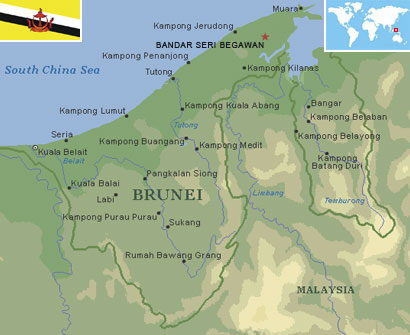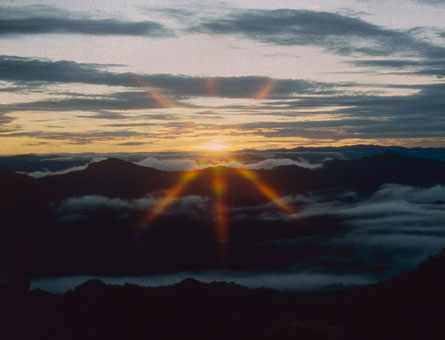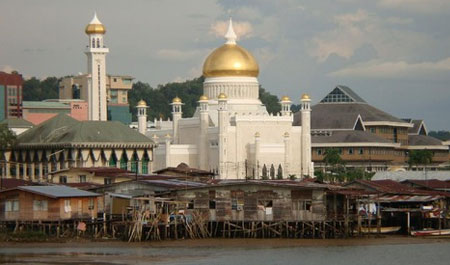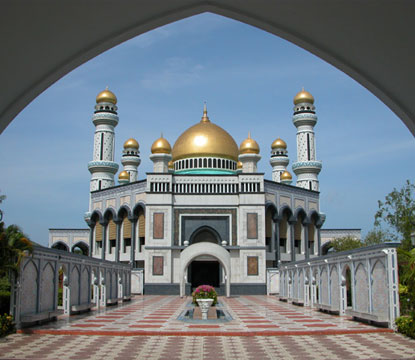Brunei
Country statistics

Land area: 2,035 sq miles (5,271 sq km)
Total area: 2,228 sq miles (5,770 sq km)
Population (2010 est.): 395,027 (growth rate: 1.7%); birth rate: 18/1000; infant mortality rate: 11.8/1000; life expectancy: 75.9; density per sq km: 72
Capital City: Bandar Seri Begawan
Monetary unit: Brunei dollar
Languages: Malay (official), English, Chinese
Ethnicity/race: Malay 67%, Chinese 15%, indigenous 6%, other 12%
Religions: Islam (official religion) 67%, Buddhist 13%, Christian 10%, indigenous beliefs and other 10%
Country introduction

Brunei is located in South-eastern Asia, bordering the South China Sea and Malaysia. All its land borders are with the Malaysian state of Sarawak, which splits Brunei into two parts. The border with Malaysia spans more than 480 km (298 miles).
The landscape is mainly pristine equatorial jungle that covers about 75% of the land, which are mostly drained by small rivers. Most settlements are situated along estuaries. There is a flat coastal plain with hilly lowland in the west and mountains to the east with Bukit Pagon being the highest mountain at 1,850 m (6,070 ft).
There are four districts: Brunei-Muara (the capital district), Tutong and Belait (the centre of oil and gas exploitation), in the western part of the country; and non-contiguous, heavily forested Temburong, in the east. The islands in Brunei Bay fall within the Brunei-Muara or Temburong districts.
Most Bruneians live in the west part with the less populated district of Temburong home to roughly 10,000 people. Bandar Seri Begawan, the capital, is the most populated city with around 130,000 residents (out of a total population of 400,000). Expatriates make up a large proportion of the total population at about 220,000. Other major towns aside from the capital include Seria, Muara and Kuala Belait. Panaga in Belait has a large expatriate community as it is home to the British Army and Royal Dutch Shell.
The culture

Brunei's culture mainly derived from the Old Malay World, a territory which covered the Malay Archipelago. Brunei's culture is therefore deeply rooted in its Malay origins, which are reflected in the nation's language, architecture, ceremonies, and customs governing daily life. Although various foreign civilisations have played a role in forming Brunei's rich history, the traditions of the Old Malay World have left an indelible mark on the culture of modern Brunei.
Today, Bruneians are predominantly Malay, although significant Chinese, Indians and indigenous Malays such as Dayaks, Dusuns and Kedazans add to the cultural makeup of Brunei. Brunei's blend of cultures, customs, beliefs and customs is therefore very similar to that of Malaysia. The nation's official language is Malay, but English is widely spoken by most of the population, and most signs in the country are written in Roman script.
If Malay traditions are Brunei's cultural root, then Islam is its heart. The nation's Malay Islamic Monarchy is a uniquely Bruneian blend combining the best of Malay culture with the teachings of Islam and a mutual respect between ruler and subjects. This national philosophy is aimed at forging a stronger sense of identity as well as fostering unity and stability, and it forms the backbone of Bruneian cultural identity. While Brunei is indeed a devoutly Muslim country, the national philosophy is one of respectful tolerance, allowing for the practice of other religions and beliefs.
Brunei has the highest living standards in the world, as the country has been fortunate enough to be blessed with sizeable deposit of oil and gas. The sultans of Brunei used the oil to expand their economy and make the nation one of the wealthiest in the region. Today, Brunei continues this trend as the people are becoming increasingly more educated and wealthy, while maintaining their Muslim way of life.
The cuisine of Brunei is similar to, and heavily influenced by the cuisine of neighbouring Malaysia, Singapore, and Indonesia, with additional influences from India, China, Thailand, and Japan. As is common in the region, fish and rice are staple foods, though beef is expensive and thus less common. Due to the predominance of the Islamic religion, the food is halal and pork is avoided. Alcohol is banned in Brunei. In rural areas, game animals such as wild birds, sambar deer, and barking deer are hunted.
Attractions & landmarks

A major attraction to Brunei is the great royal mosque, the Jame' Asr Hassanil Bolkiah, which is considered one of the wonders of Islam. A gift to the nation from His Majesty the Sultan Haji Hassanal Bolkiah Mu'izzaddin Waddaulah and Yang Dipertuan Negara Brunei Darussalam, its pure magnificence is unequalled. Known locally as the Kiarong Mosque as it is situated in Kampong Kiarong, a few kilometres from the capital, it was built to commemorate the 25th anniversary of His Majesty's accession to the throne. The fine artistry of the structure's basic design as well as the interiors shows the meticulous attention to details and reveals the depth of the love that inspired the vision to build this splendid symbol of devotion to Islam.
Equally impressive is the Sultan Omar Ali Saifuddien Mosque, built by the father of the present Sultan, Haji Sir Muda Omar Ali Saifuddien, who was the ruler when the building was completed in 1958. The mosque is one of the most impressive in Southeast Asia. Italian marble was used for the floors and Shanghai granite for the outer walls. The chandeliers and stained glass windows came from Britain while the carpets were imported from Saudi Arabia and Belgium. The glistening gold dome is made up of 3.3 million pieces of Venetian mosaic covering 520 sq m (1,706 sq ft). On three sides the mosque is surrounded by a lagoon, at the centre of which is a replica of a 16th-century Royal barge (Mahligai) used occasionally for religious ceremonies such as the annual Quran reading competition.
The capital city of Bandar Seri Begawan, often simply referred to as Bandar or BSB is a tourist attraction not to miss. It boasts one of the world's largest water village, Kampong Ayer, where some 30,000 people still live in wooden houses on stilts. This place is sometimes called the 'water village'. Overlooking this remarkable sight is the Majestic Sultan Omar Ali Saifuddin Mosque and the Sultan's palace, or Istana as it is known locally, which is the largest palace in the world with 1,788 rooms.
Not far from Bandar are a number of interesting natural and cultural attractions which can easily be visited on day trips, such as the hauntingly beautiful Merimbun Lake. It is a remote jungle surrounded by a distinctive black water lake, or the Ulu Temburong National Park, which is a well preserved rainforest with a challenging canopy walkway. The odd looking proboscis monkey, prevalent in Borneo, can be spotted easily minutes away by boat from downtown Bandar, and Pulau Selirong, one of the best preserved mangrove islands.
The jewel in the crown of Brunei's man made attractions is the Empire Hotel and Country Club, an opulent and exquisite "7 Stars" property, complete with a private beach, golf course, children's playground, theatre, cineplex, bowling alley, food and beverage outlets, shopping gallery and an 18-hole Jack Nicklaus designed championship course.